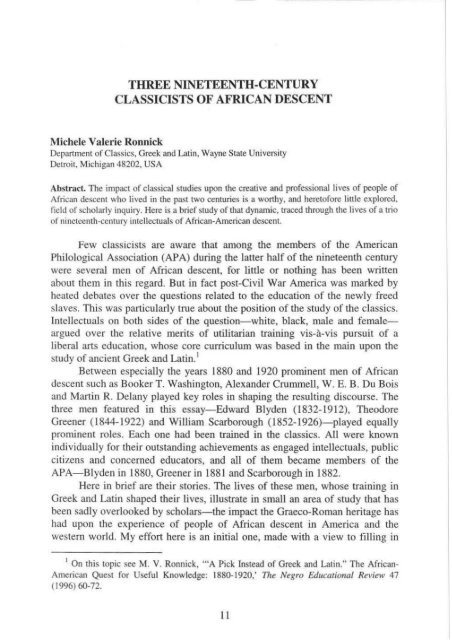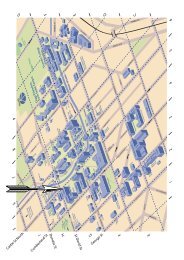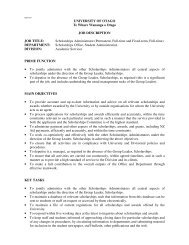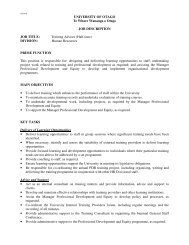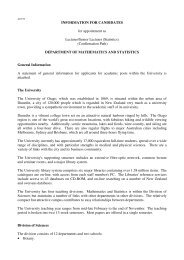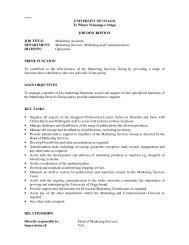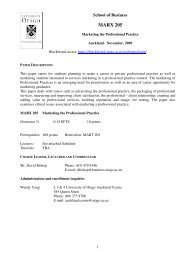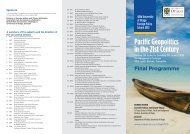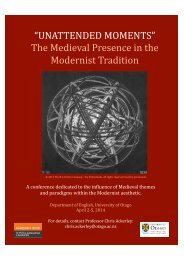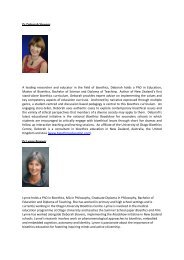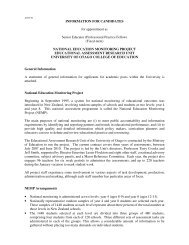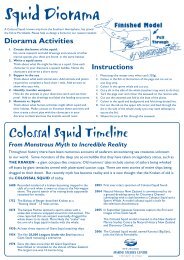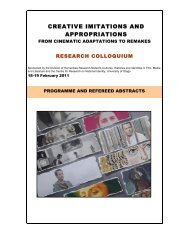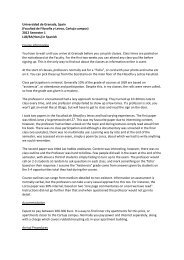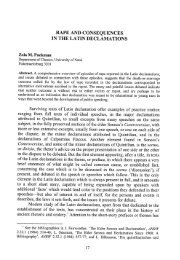scholia - University of Otago
scholia - University of Otago
scholia - University of Otago
Create successful ePaper yourself
Turn your PDF publications into a flip-book with our unique Google optimized e-Paper software.
THREE NINETEENTH-CENTURY<br />
CLASSICISTS OF AFRICAN DESCENT<br />
Michele Valerie Ronnick<br />
Department <strong>of</strong> Classics, Greek and Latin, Wayne State <strong>University</strong><br />
Detroit, Michigan 48202, USA<br />
Abstract The impact <strong>of</strong> classical studies upon the creative and pr<strong>of</strong>essional Jives <strong>of</strong> people <strong>of</strong><br />
African descent who lived in the past two centuries is a worthy, and heret<strong>of</strong>ore little explored,<br />
field <strong>of</strong> scholarly inquiry. Here is a brief study <strong>of</strong> that dynamic, traced through the lives <strong>of</strong> a trio<br />
<strong>of</strong> nineteenth-century intellectuals <strong>of</strong> African-American descent.<br />
Few classicists are aware that among the members <strong>of</strong> the American<br />
Philological Association (AP A) during the latter half <strong>of</strong> the nineteenth century<br />
were several men <strong>of</strong> African descent. for little or nothing has been written<br />
about them in this regard. But in fact post-Civil War America was marked by<br />
heated debates over the questions related to the education <strong>of</strong> the newly freed<br />
slaves. This was particularly true about the position <strong>of</strong> the study <strong>of</strong> the classics.<br />
Intellectuals on both sides <strong>of</strong> the question-white, black, male and femaleargued<br />
over the relative merits <strong>of</strong> utilitarian training vis-a-vis pursuit <strong>of</strong> a<br />
liberal arts education, whose core curriculum was based in the main upon the<br />
study <strong>of</strong> ancient Greek and Latin. 1<br />
Between especially the years 1880 and 1920 prominent men <strong>of</strong> African<br />
descent such as Booker T. Washington, Alexander Crummell, W. E. B. DuBois<br />
and Martin R. Delany played key roles in shaping the resulting discourse. The<br />
three men featured in this essay-Edward Blyden (1832-1912), Theodore<br />
Greener (1844-1922) and William Scarborough ( 1852-1926)-played equally<br />
prominent roles. Each one had been trained in the classics. All were known<br />
individually for their outstanding achievements as engaged intellectuals, public<br />
citizens and concerned educators, and all <strong>of</strong> them became members <strong>of</strong> the<br />
APA-Blyden in 1880, Greener in 1881 and Scarborough in 1882.<br />
Here in brief are their stories. The lives <strong>of</strong> these men, whose training in<br />
Greek and Latin shaped their lives, illustrate in small an area <strong>of</strong> study that has<br />
been sadly overlooked by scholars-the impact the Graeco-Roman heritage has<br />
had upon the experience <strong>of</strong> people <strong>of</strong> African descent in America and the<br />
western world. My effort here is an initial one, made with a view to filling in<br />
1 On this topic see M. V. Ronnick, '"A Pick Instead <strong>of</strong> Greek and Latin." The African<br />
American Quest for Useful Knowledge: 1880-1920,' The Negro Educational Review 47<br />
( 1996) 60-72.<br />
11<br />
- j


